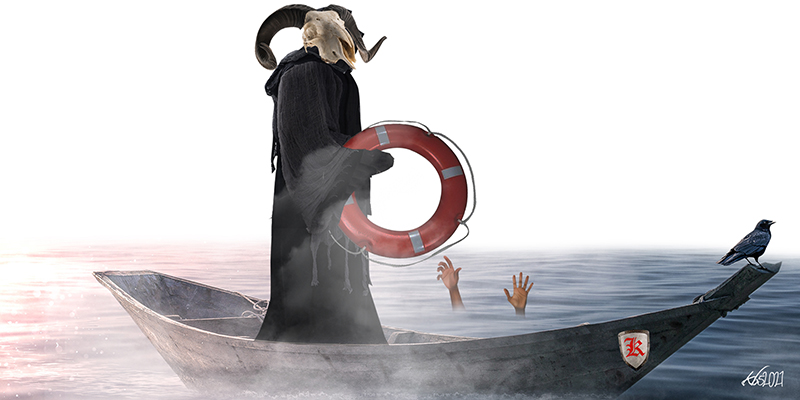Kenyans on Twitter (#KOT) – a fraternity not to be messed with on global social media – recently took on the IMF following the announcement that the Fund had approved another US$2.34 billion facility for the Kenyan government. The loan is intended to mitigate the fiscal crunch that has been exacerbated by the COVID-19 pandemic. #KOT’s concern was that the current ruling elite is so corrupt that not only have they stolen and misspent what they had previously borrowed, leading to a public debt portfolio of US$70 billion and rising, they will steal and misspend this new amount as well.
The IMF was forced to respond virtually – which was interesting – explaining the governance conditionalities attached to this latest facility. The Fund’s explanation did little to calm Kenyans and the debate still rages; for many, simply put, the IMF is being asked why it is serving whiskey to an alcoholic on condition that the alcoholic only takes a tot a day and imbibes “carefully”. Kenyans on Twitter believe they know their government better; they are likely right. Unfortunately, no matter how well intentioned, the IMF toolkit is limited – the austerity spanner, loan wrench, conditionality screwdrivers and advisory nuts and bolts, these have been used before, in the 1990s, but this time the consumer is far more sceptical, and with good reason.
We are in the middle of major political realignments as we head into the 2022 general election, with President Uhuru Kenyatta currently serving his last term but clearly keen on a transition that will leave his family’s influence intact. The overall behaviour of the regime, and the elite at its core, is imbued with an assumption of impunity; they have since independence eluded accountability. This impunity gene in our politics can be traced back to the creation of Kenya by the Imperial British East Africa Company (IBEA), a group of businessmen with a royal charter to grab, tax, kill and essentially enslave the population at will. A combination of corruption, profligacy, incompetence, rapacious personalised accumulation, spiralling debt and now the devastating COVID-19 epidemic has – ironically – created the circumstances for the elite to think its way out of a crisis of its own making; as they say, never let a good crisis go to waste. Indeed, others have been here before.
*******
Some senior civil servants – and even the president himself, so I am told – are known to be fans of Lee Kuan Yew’s book From Third World to First: The Singapore Story – 1965-2000 and share it liberally among colleagues. If they have read it, it is not always clear that they have understood it. A number of Asian countries – notably Singapore, South Korea, Taiwan and to a lesser extent Thailand and Malaysia – used the crisis conditions following the Second World War to change the behaviour of their elite and transform their economies and societies. As Ken Ohashi – one-time Senior Economic Advisor to the Kenyan Presidency – explained in a feature carried in The Standard, the East Asian success stories emerged significantly out of a shift away from an “elite-favouring, rent-seeking centred economy” to economies structured to advance when individuals and companies come up with new ideas and are spurred by fair competition. Taiwan, South Korea and Singapore in particular took a dramatic shift away from our elite’s rent-seeking model of business.
In South Korea, President Park Chung-hee, who came to power in a military coup in 1961, ended the Kenyan style of corruption-oriented business by the political and commercial elite. He called in leaders of the traditional, largely family-owned businesses (the chaebols) and essentially forced them to become internationally competitive manufacturers. Ultimately, the majority couldn’t survive in an environment where they could not manipulate government policy and fiddle the books. But the Samsungs, Hyundais etc., flourished and are global giants today. As Ohashi argues, “Corruption never disappeared, but it ceased to be the mainstay of business strategy . . . Taiwan and Singapore managed to revamp the fundamental business culture in a similar way and created an environment in which most companies focused singularly on producing competitive and increasingly higher-value products.”
*******
In Kenya’s history, the Jubilee regime has been the most sophisticated at managing the perceptions of its performance. Jubilee’s launches of bridges, roads, government programmes and other initiatives are slick and the speeches well written. This is true even when they are launching the same project multiple times. They have also spent more money than any other previous regime doing this. However, in the digital age, they have ultimately struggled and the narrative their media managers try to sell is so far removed from reality that the entire enterprise – even augmented by the likes of Cambridge Analytica – has collapsed in on itself.
This demonstrates the impact social media has had on the political terrain not only in Kenya but all over the world. As governments have become increasingly authoritarian and as the globalisation model has faltered, social media has become a space that is freer than the streets, particularly for the youth. As a result, more and more governments across the developing world have resorted to private intelligence, PR and other reputational management companies to manage this space while others, especially during elections, simply switch off the internet, a tactic that Ethiopia, Zimbabwe, Morocco, Benin, Rwanda, Morocco, Democratic Republic of Congo and Uganda have resorted to in the recent past. However, this is not so easy in economies with a reasonably developed service sector and a relatively high use of financial technology.
In Kenya we have several governance balls in the air at the same time: elections (traditionally our season of grand theft); President Uhuru Kenyatta’s transition as he serves out his final term amid talk of changing the constitution and even holding a referendum to effect the change; spiralling corruption and debt; and the return of IMF conditionalities of the kind last witnessed in the 1990s. This time, however, and as I mentioned above, the IMF is confronted with a totally new demographic across Africa. It is overwhelmingly young – below 35; increasingly interconnected by technology; mistrustful of the World Banks and IMFs of this world, and also more aware of the inequities that the elites have wrought in the pre-pandemic era of globalisation.
Kenya’s political elite: hardened and resilient mystifiers
Still, Kenya has one of the continent’s most experienced and resilient political elites. They have over 50 years of experience in political wheeler-dealing, skulduggery, deal-making and sharing the loot from public coffers – uninterrupted by coups, major social meltdowns or grand economic experiments. The odd thing about the corruption perpetrated by an even minimally coherent elite is that it produces a stagnating political stability so long as there is enough loot to share around. It is not an ideal situation and it is fraught with deepening inequality and declining public trust in governance institutions and in the politicians themselves. Still, the guys at the top can hold on and even sustain a hegemon on the basis of backroom deals, understandings and accommodations. And with the right foreign friends this job is made even easier.
Currently, there is considerable bewilderment about the Kenyatta succession as our politicians position themselves for the 2022 elections. Part of this is deliberate mystification. Newspaper headlines sometimes seem to derive from a single photo of politicians at a meeting posted on Twitter where it’s not at all clear what the discussions were about. The mystification is also in part caused by the fact that there are no ideological or significant policy differences between the different competitors for the presidency. Even COVID-19 – the disruptor of the century – hasn’t changed their modus operandi.
The odd thing about the corruption perpetrated by an even minimally coherent elite is that it produces a stagnating political stability so long as there is enough loot to share around.
The pandemic has stripped naked the governance models of all nations and it has been surprising to see what is hidden underneath all the constitutions, institutions, platitudes and political theatre. It has led to a resurgence of authoritarianism where democracy was already in recession globally and there is disquiet that some states will fail. Add to this the fact that China is now a risen power and for the first time, under President Xi, is directly marketing its technocratic/meritocratic authoritarian model as an alternative to liberal democracy which is noisy and free but which can, as a result, be slower in delivering public goods and has, in recent years, produced dangerously comical leaders in some of the most developed countries in the world. China will clearly play a significant role in defining the post-pandemic geopolitical reality.
For our ruling elite, however, the confusion is compounded by the 2010 Constitution which has placed severe limitations on their capacity to disrupt both each other and the governance institutions for their personal political ends. Indeed, the 2010 Constitution was written specifically because of the elite’s penchant to manipulate the previous constitution to their political advantage, as witnessed from 1964 to the late 1990s. Some have described it as a “rule book for naughty boys”, full of self-executing provisions and with a level of detail in terms of institutional design that betrays a lack of trust on the part of its drafters that the elite have any real fidelity to the spirit of the document.
Kenyatta Inc.
What our current elite does now will determine what Kenya will look like in the coming decades. It is thus that Uhuru Kenyatta, who should be a lame duck by now, continues to play an energetic role in his own succession – not necessarily because of his grip on political matters but because of the Kenyattas’ unique private commercial achievements. In fact, there is some concern that all the realignments and political shenanigans could make the 2022 polls more destabilising than previous transition elections. Traditionally, incumbency elections in Kenya – where a head of state is going into elections to compete for another term – are the most violent, as was the case in 1992, 1997 and 2007. Transition elections, on the other hand, when a head of state is serving his last term, as in 2002 and 2013, are far more peaceful.
The Kenyatta family enterprise, whose foundation is built on land acquired during President Jomo Kenyatta’s tenure between 1964 and 1978, is now a highly diversified fledging multinational, with Brookside Dairies as its flagship and significant international shareholding. These commercial interests have been expanded, diversified and consolidated during Uhuru Kenyatta’s tenure as president. Chapter VI of the constitution on Leadership and Integrity – especially those of its provisions that touch on conflict of interest – does not exist in our political reality.
Meanwhile, public debt has accumulated so rapidly under the Kenyatta regime – Kenyans believe that much of it has been misappropriated – that the mess in public finances no longer has a technical fix, only a political one. Indeed, the outrage expressed by Kenyans on social media at the IMF’s US$2.3 billion facility was caused by the belief among many that this money will also be stolen. Some of the conditionalities the IMF has insisted on in apparent good faith – such as the reform of key state-owned enterprises – were particularly controversial because of the conviction among some that this was a green light for them to be taken over by the very people who precipitated the debt crisis in the first place.
Chapter VI of the constitution on Leadership and Integrity – especially those of its provisions that touch on conflict of interest – does not exist in our political reality.
Local real estate company Knight Frank estimated that by last year Kenya had over 3,000 dollar millionaires. The question that looms over the succession and transition currently underway – and which may explain why it is so confusing – is this: a small group of families have emerged from the last eight years spectacularly wealthy; how do they protect this wealth going forward? Similar questions faced elites in South Korea, Japan, Taiwan, Singapore, etc., especially after the Second World War, but the elites in those countries ultimately chose a generally inclusive form of meritocratic governance.
There are many elites who, having accumulated wealth which they wish to protect in perpetuity, choose to securitise and militarise their politics – essentially throw liberal constitutions out of the window and hold on to the power to steal through a mixture of manipulation, bribery and force. There are those who would argue that the Building Bridges Initiative (BBI) is a vehicle to politically engineer the elite out of the structures imposed on them by the current constitution and essentially emerge with a political deal that serves all their political and commercial interests. Others argue that the elite inclusivity that informs the Building Bridges Initiative – expensive as it will be – is just what Kenya needs. This is a considerably more uncertain model than, say, the Taiwanese or South Korean ones, where the elites fashioned a political and constitutional arrangement that served not just their own interests but those of the entire population as well. Securing the peace and prosperity of the masses is the surest protection for the wealth of the elite.
The combination of factors – the impact of COVID-19; upcoming elections with all the realignments they imply; a volatile region; increasingly unmanageable debt; and, most importantly, the demographic challenge of a now thoroughly disillusioned youth who no longer believe politicians or trust their own governance institutions – will force some of the most consequential choices our hardened elite have ever made. Multinationals like the Kenyattas’ need political predictability and policy consistency unless they are in the extractive sector, selling alcohol, drugs or cigarettes rather than perishables like milk and yoghurt.







